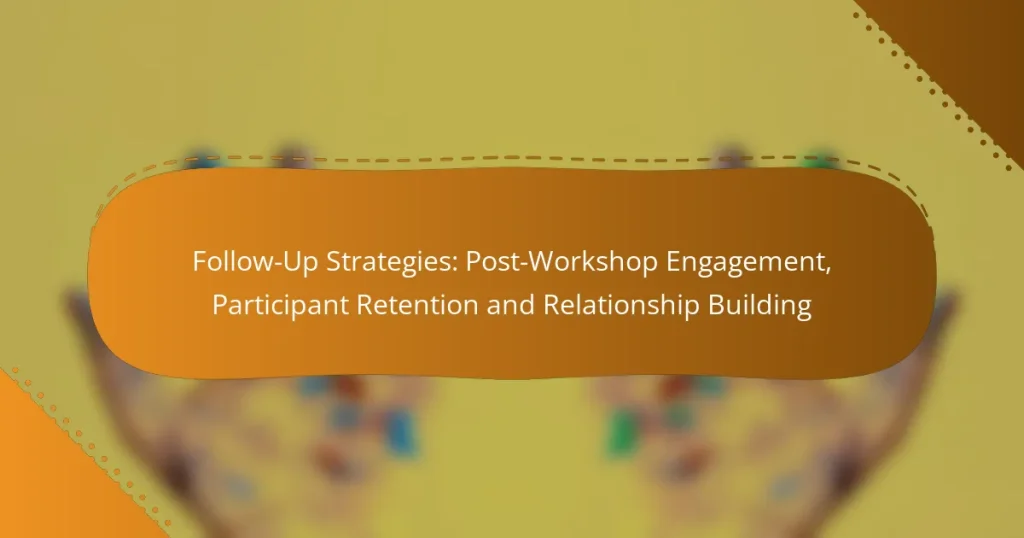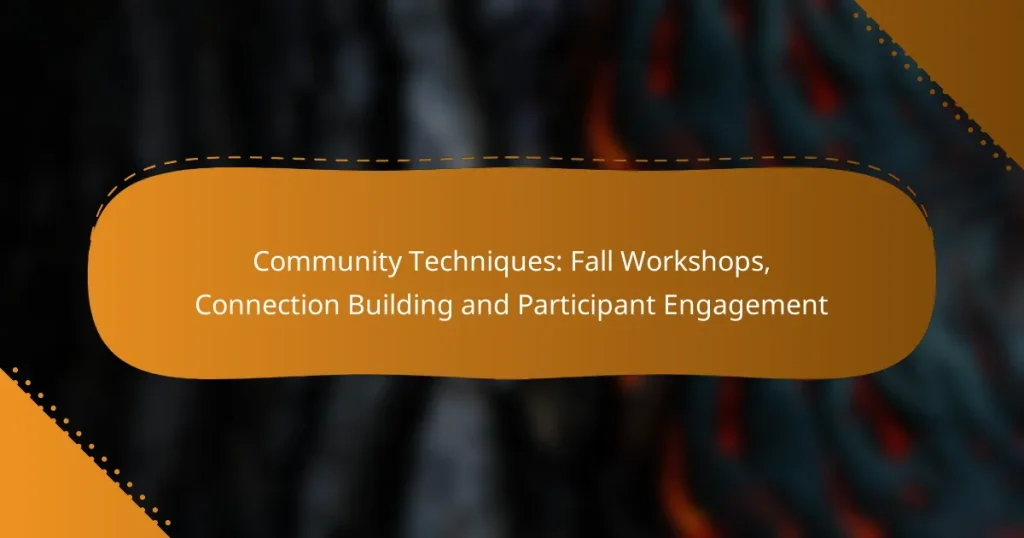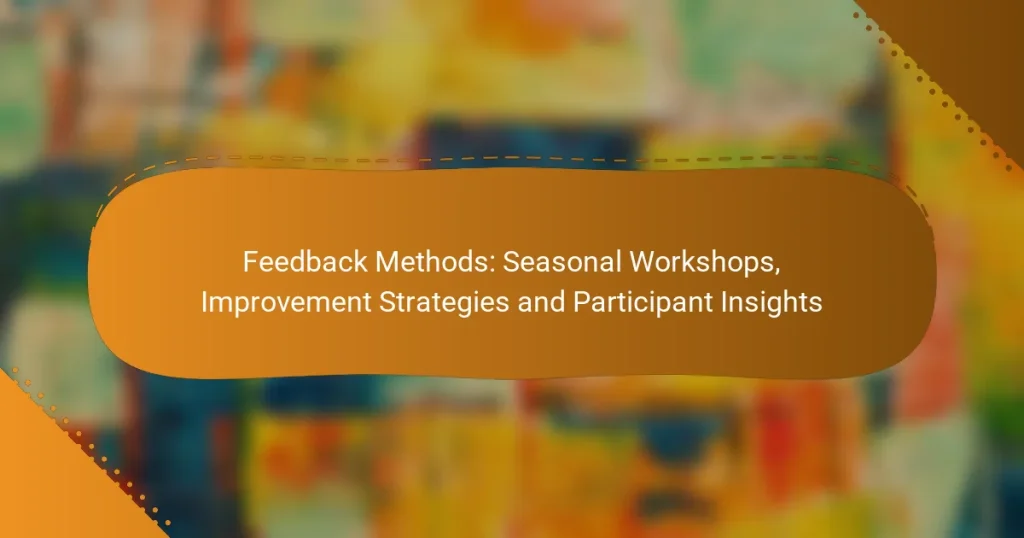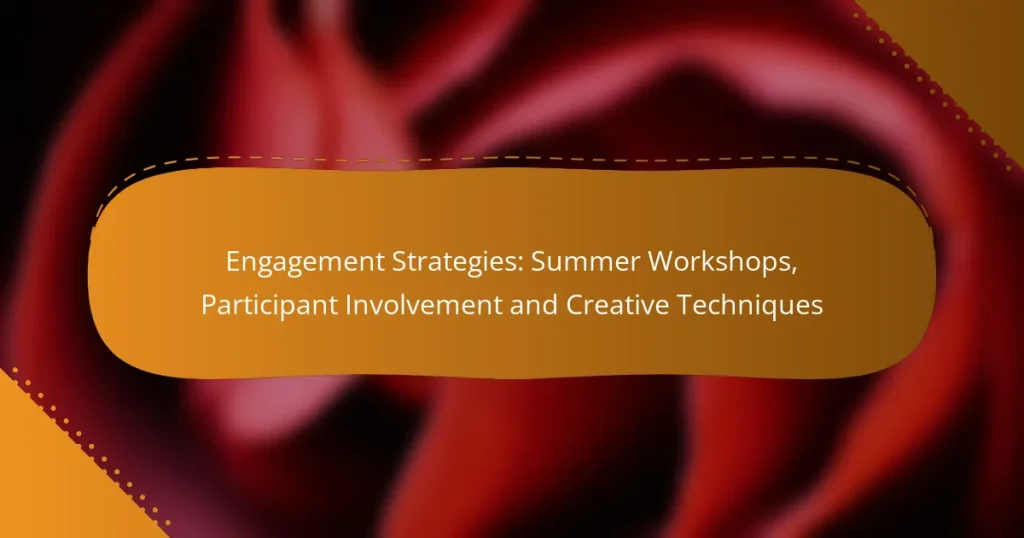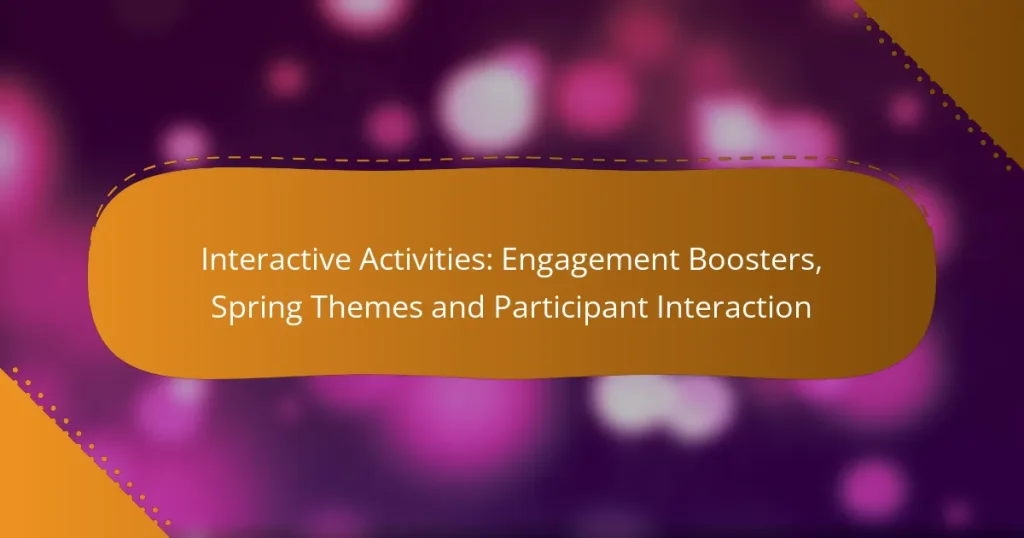Seasonal creative workshops offer a unique opportunity to engage audiences by tapping into themes that resonate with the time of year. By fostering an interactive and collaborative environment, these workshops can enhance community involvement and inspire creativity. Utilizing effective tools and techniques can further elevate participant engagement, making the experience enjoyable and memorable.
Follow-Up Strategies: Post-Workshop Engagement, Participant Retention and Relationship Building
Community Techniques: Fall Workshops, Connection Building and Participant Engagement
Icebreaker Activities: Seasonal Workshops, Participant Comfort and Engagement
Feedback Methods: Seasonal Workshops, Improvement Strategies and Participant Insights
Engagement Strategies: Summer Workshops, Participant Involvement and Creative Techniques
Interactive Activities: Engagement Boosters, Spring Themes and Participant Interaction
What are the best seasonal creative workshop ideas for audience engagement?
Engaging audiences through seasonal creative workshops can enhance community involvement and foster creativity. The best ideas often revolve around themes that resonate with the time of year, encouraging participation and connection.
Holiday-themed crafting sessions
Holiday-themed crafting sessions allow participants to create decorations or gifts that celebrate the season. These workshops can include making ornaments, wreaths, or personalized cards, which can be sold at local markets or given as gifts.
Consider providing all necessary materials and setting a relaxed atmosphere to encourage creativity. Sessions can range from a couple of hours to a full day, depending on the complexity of the projects.
Seasonal cooking classes
Seasonal cooking classes focus on using fresh, local ingredients to prepare dishes that reflect the flavors of the season. For example, autumn classes might feature pumpkin recipes, while summer classes could highlight fresh fruits and vegetables.
These classes can be hands-on, allowing participants to cook together and share their creations. Offering a tasting session at the end can enhance the experience and encourage social interaction.
Outdoor nature workshops
Outdoor nature workshops provide a chance for participants to connect with the environment while engaging in creative activities like painting, photography, or nature journaling. These workshops can be held in parks or nature reserves, leveraging the beauty of the changing seasons.
Ensure to check local regulations regarding group sizes and permits for outdoor activities. Sessions can be designed for various skill levels, making them accessible to a broad audience.
Festive storytelling events
Festive storytelling events invite participants to share tales related to the season, whether traditional folklore or personal anecdotes. These gatherings can be organized in community centers or outdoor spaces, creating a warm, inviting atmosphere.
Encourage storytelling by providing prompts or themes, and consider incorporating music or visual elements to enhance the experience. Such events can foster community bonds and spark creativity in storytelling.
Seasonal photography challenges
Seasonal photography challenges encourage participants to capture the essence of the season through their lenses. These challenges can be structured as competitions or collaborative projects, focusing on themes like winter landscapes or spring blooms.
Provide guidelines on what to photograph and offer tips on techniques to improve skills. Sharing the results through social media or local exhibitions can further engage the community and celebrate participants’ creativity.
How can I enhance audience participation in workshops?
Enhancing audience participation in workshops involves creating an engaging environment that encourages interaction and collaboration. Techniques such as interactive activities and the use of technology can significantly boost involvement and make the experience more enjoyable for participants.
Interactive group activities
Interactive group activities are essential for fostering engagement among workshop attendees. These activities can include brainstorming sessions, role-playing, or team challenges that require collaboration. For instance, dividing participants into small groups to solve a problem can stimulate discussion and generate diverse ideas.
When planning these activities, consider the size of your audience and the available time. Aim for activities that allow everyone to contribute, ensuring that no one feels left out. A common pitfall is overloading participants with too many tasks; instead, focus on a few well-structured activities that encourage meaningful interaction.
Incorporating technology tools
Incorporating technology tools can greatly enhance audience participation in workshops. Tools like live polling, interactive presentations, and collaborative platforms (such as Miro or Mentimeter) allow participants to engage in real-time. These tools can make the workshop more dynamic and provide instant feedback on audience opinions and understanding.
When selecting technology, ensure it is user-friendly and accessible to all participants. Test the tools beforehand to avoid technical issues during the workshop. Additionally, consider providing a brief tutorial at the beginning to familiarize attendees with the technology, which can help reduce anxiety and increase participation.
What tools can facilitate seasonal workshops?
Various tools can enhance the effectiveness of seasonal workshops by streamlining organization, communication, and collaboration. Selecting the right tools can significantly improve participant engagement and overall workshop success.
Event management software
Event management software simplifies the planning and execution of seasonal workshops by providing features like registration, ticketing, and scheduling. Popular options include Eventbrite and Cvent, which allow organizers to manage attendee lists and send automated reminders.
When choosing event management software, consider factors such as user-friendliness, integration capabilities with other tools, and pricing structures. Many platforms offer tiered pricing, so assess your budget and expected attendance to find the best fit.
Creative collaboration platforms
Creative collaboration platforms foster teamwork and idea-sharing among participants during workshops. Tools like Miro and Trello enable real-time brainstorming, project tracking, and visual organization of ideas, making them ideal for creative sessions.
To maximize the benefits of these platforms, ensure all participants are familiar with the chosen tool before the workshop. Providing a brief tutorial or resources can help avoid technical difficulties and keep the focus on creativity and collaboration.
What are the key criteria for selecting workshop themes?
Key criteria for selecting workshop themes include understanding your audience’s demographics and ensuring seasonal relevance. These factors help create engaging and meaningful experiences that resonate with participants.
Audience demographics
Understanding audience demographics is crucial for tailoring workshop themes effectively. Consider factors such as age, gender, cultural background, and professional interests. For instance, a workshop aimed at young professionals may focus on networking skills, while one for retirees might emphasize creative hobbies.
Gathering demographic data can be done through surveys or registration forms. This information allows you to customize content, making it more appealing and relevant to your participants.
Seasonal relevance
Seasonal relevance enhances engagement by aligning workshop themes with current events or holidays. For example, a workshop on gift-making can be popular during the winter holidays, while a gardening workshop may attract interest in spring. Timing your workshops to coincide with seasonal trends can significantly boost attendance.
When planning, consider local events or seasonal activities that may influence your audience’s interests. This approach not only increases participation but also fosters a sense of community and shared experience among attendees.
How can I promote seasonal workshops effectively?
To promote seasonal workshops effectively, leverage a mix of digital and local strategies that resonate with your target audience. Focus on engaging content, clear calls to action, and partnerships that enhance visibility.
Social media marketing strategies
Utilize platforms like Facebook, Instagram, and Twitter to create buzz around your seasonal workshops. Share visually appealing posts, stories, and videos that highlight workshop activities, benefits, and participant testimonials.
Consider using targeted ads to reach specific demographics, especially during peak seasons. Engaging with followers through polls, contests, and live Q&A sessions can also boost interaction and interest.
Email campaigns
Email marketing remains a powerful tool for promoting workshops. Create a segmented email list to tailor messages based on previous participation or expressed interests. Use eye-catching subject lines and concise content to encourage opens and clicks.
Include clear calls to action, such as “Register Now” or “Limited Spots Available,” to create urgency. Sending reminders as the workshop date approaches can help increase attendance rates.
Local community partnerships
Partnering with local businesses and organizations can enhance your workshop’s visibility. Collaborate with community centers, schools, or local influencers to reach a wider audience and gain credibility.
Consider co-hosting events or offering discounts to members of partner organizations. This not only promotes your workshop but also fosters goodwill within the community, encouraging more participants to join.
What are the emerging trends in audience engagement for workshops?
Emerging trends in audience engagement for workshops focus on innovative technologies and personalized experiences. These approaches enhance interaction, making workshops more immersive and tailored to participants’ needs.
Virtual reality experiences
Virtual reality (VR) experiences create immersive environments that can significantly enhance audience engagement. By allowing participants to interact in a simulated space, VR can facilitate deeper learning and retention of information.
When implementing VR, consider the technical requirements and the comfort level of your audience with technology. Providing clear instructions and support is essential to ensure a smooth experience. For example, a workshop on architecture could use VR to allow participants to explore a virtual building design.
Hybrid event formats
Hybrid event formats combine in-person and virtual participation, catering to a broader audience. This approach allows those who cannot attend physically to engage in real-time, increasing overall attendance and interaction.
To effectively execute a hybrid workshop, invest in quality streaming technology and ensure that both in-person and online participants can interact seamlessly. For instance, using live polls and Q&A sessions can engage both groups equally, fostering a sense of community.
Personalized workshop experiences
Personalized workshop experiences tailor content and activities to the specific interests and needs of participants. This customization can lead to higher satisfaction and engagement levels, as attendees feel their unique perspectives are valued.
To create personalized experiences, gather information about participants beforehand through surveys or registration forms. Use this data to design breakout sessions or activities that align with their interests. For example, if a workshop on marketing has attendees from different industries, consider offering industry-specific case studies during the sessions.

